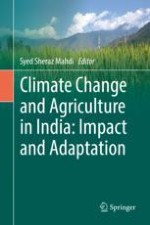2019 | OriginalPaper | Chapter
13. Decreasing the Vulnerability to Climate Change in Less Favoured Areas of Bihar: Smart Options in Agriculture
Authors : Anshuman Kohli, Sudhanshu Singh, Sheetal Sharma, S. K. Gupta, Mainak Ghosh, Y. K. Singh, B. K. Vimal, Vinay Kumar, Sanjay Kumar Mandal
Published in: Climate Change and Agriculture in India: Impact and Adaptation
Publisher: Springer International Publishing
Activate our intelligent search to find suitable subject content or patents.
Select sections of text to find matching patents with Artificial Intelligence. powered by
Select sections of text to find additional relevant content using AI-assisted search. powered by
